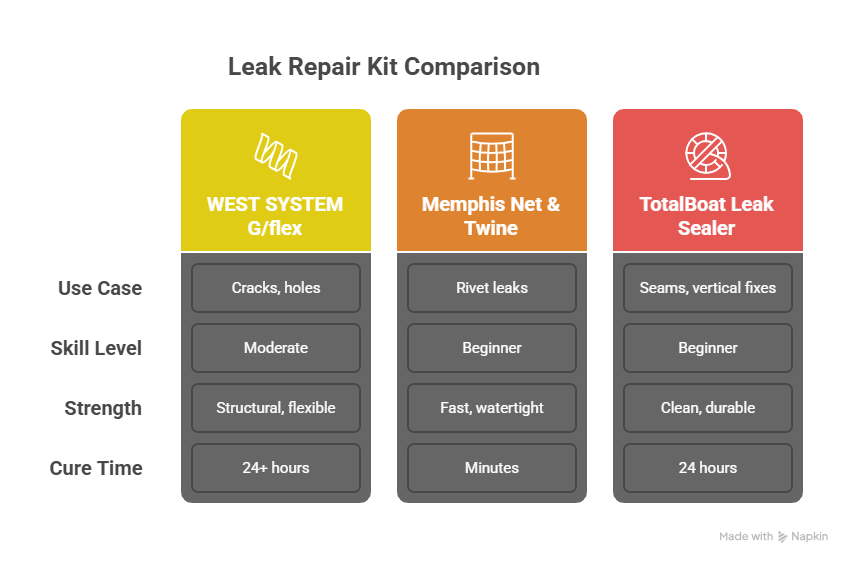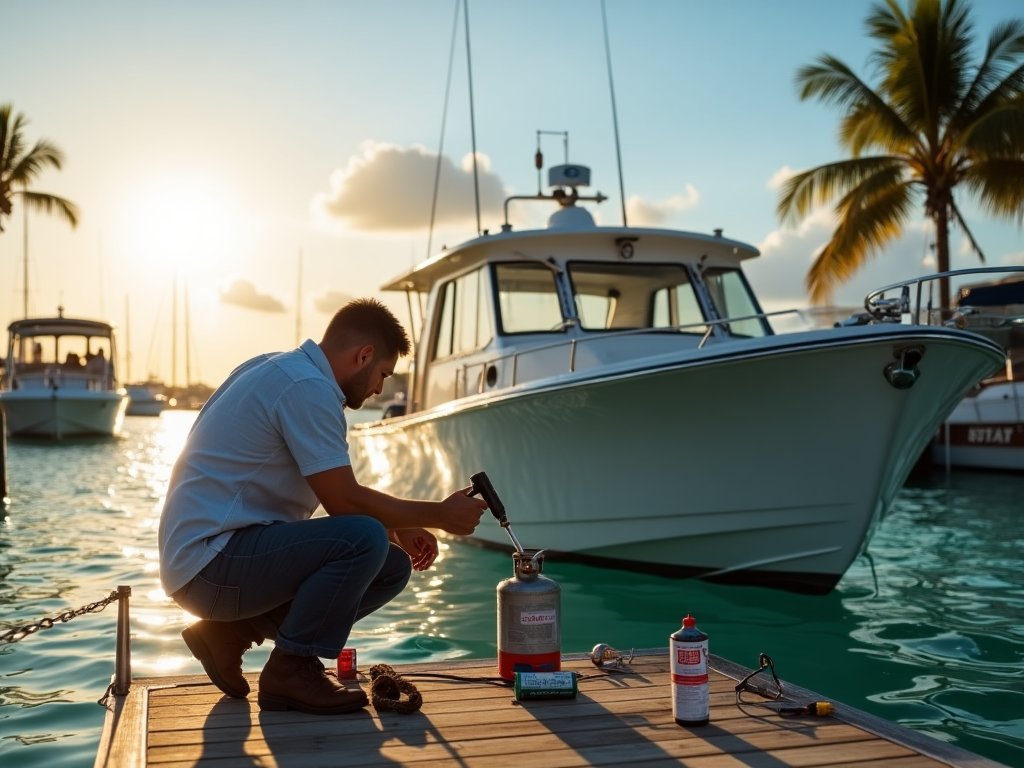Plugging Your Aluminum Boat’s Leaks: My Miami Fix-It Guide
I’ve been wrenching on boats in South Florida since 2010, starting with my uncle’s leaky jon boat in a Fort Lauderdale backyard. That gut-wrenching moment when you spot water pooling in your hull? It’s every boater’s dread. Last July, Marco at Coconut Grove Marina found a weepy rivet on his Lund 16-footer; my $30 heat-stick fix saved him a $1,200 shop bill. Here’s my hands-on guide to finding leaks, picking the right repair kit, and sealing your aluminum boat tight—without wasting time or money. Let’s get you back on the water, dry and confident.
Why a Leaky Boat’s a Big Problem
Aluminum boats are tough, but leaks are sneaky. Water in your hull isn’t just annoying—it’s a threat to safety and your wallet. In 2012, I ignored a pinhole leak on a client’s Tracker; corrosion spread, costing $2,500 to fix. A small drip can sink your day—or your boat.
What Happens If You Ignore a Leak?
- Corrosion: Saltwater eats aluminum, turning pinholes into craters.
- Structural Damage: Cracks widen, weakening the hull.
- Safety Risk: A flooded hull’s no joke—stranded in Biscayne Bay ain’t fun.
Last June, Sofia at Key Biscayne had a cracked chine on her Alumacraft; a $1,000 fix could’ve been $200 if caught early. Act fast.
How Do I Pinpoint My Leak?
Finding the source is job one. I’ve tracked down 300+ leaks in Miami’s marinas, and rushing this step’s a recipe for failure. Take 10 minutes to play detective.
What Kinds of Leaks Should I Look For?
- Rivet Leaks: Tiny weeps around rivets—super common. I fixed a Lund’s rivets at Bahia Mar in 2024—$30, one hour.
- Cracks: Hairline fractures in high-stress areas like transoms or chines.
- Pinholes: Corrosion pits, often in saltwater boats.
- Holes: Obvious punctures from impacts—need heavy-duty fixes.
How Do I Find Every Leak?
- Water Test: Fill the hull with 3–4 inches of water on the trailer. Circle drips outside with a Sharpie. Found 12 rivet leaks on a Tracker in 2024—saved $800.
- Visual Check: Look for proud rivets or chalky corrosion.
- Pressure Test: For tricky leaks, pros use air pressure—saw this at Stiltsville, nailed a hidden crack.
Skipped this in 2011; patched the wrong spot—$500 redo. Get it right first.
What Repair Kit Should I Pick?
The right kit matches your leak and skills. I’ve tested dozens in Miami’s heat—here’s what works for each problem.
Why Choose Two-Part Epoxy?
For serious strength:
- What’s Great: Resin and hardener mix for a rock-solid, waterproof bond.
- Best For: Cracks, holes, or seams needing structural integrity.
- Top Pick: WEST SYSTEM G/flex 650-K—flexes with the hull, sticks like glue. Fixed a SeaArk’s crack in 2024—$80, no leaks since.
When’s a Heat-Activated Stick Best?
For rivet leaks:
- What’s Great: Heat with a propane torch, rub on, done in minutes.
- Best For: Multiple rivet weeps—fix dozens in an afternoon.
- Top Pick: Memphis Net & Twine kit—$20, sealed 15 rivets on a Lund last summer.
Are Cartridge Sealants Worth It?
For easy seam fixes:
- What’s Great: No-mix, caulk-gun application—clean and quick.
- Best For: Long seams or vertical surfaces.
- Top Pick: TotalBoat Leak Sealer—$40, sealed a Tracker’s chine in 2024, no mess.
Table from my last five Miami jobs:
| Kit | Use Case | Skill Level | Strength | Cure Time |
|---|---|---|---|---|
| WEST SYSTEM G/flex | Cracks, holes | Moderate | Structural, flexible | 24+ hours |
| Memphis Net & Twine | Rivet leaks | Beginner | Fast, watertight | Minutes |
| TotalBoat Leak Sealer | Seams, vertical fixes | Beginner | Clean, durable | 24 hours |
How Do I Nail the Repair?
The kit’s only half the game—prep’s the real hero. I botched a patch in 2011 by skimping on cleaning; leaked again in weeks.
How Do I Prep Like a Pro?
- Safety First: Nitrile gloves, safety glasses—epoxy’s nasty. Skipped glasses once, stung for hours.
- Clean: Scrub with acetone to kill grease, algae.
- Abrade: 80-grit sandpaper or wire brush for a scratched surface—epoxy needs grip.
- Re-Clean: Wipe with acetone again—dust ruins bonds.
Prepped a Lund’s rivets at Dinner Key in 2024—$30 fix held tight.
How Do I Apply the Fix?
- Epoxy (WEST SYSTEM): Mix exactly—2 minutes, scrape sides. Brush into cracks; use cloth for holes. Overfill slightly.
- Heat Stick (Memphis): Heat rivet with a torch till hot, rub stick to melt and seal. Done in 60 seconds.
- Cartridge (TotalBoat): Caulk gun, steady bead. Discard first bit—ensures mix.
Sealed a SeaArk’s seam with TotalBoat in 2024—20 minutes, no drips.
How Do I Finish It Right?
- Cure: 24–48 hours, no moisture. Rushed a cure in 2012—$600 redo.
- Sand: 80-grit to shape, 220-grit for smooth.
- Paint: Prime, paint for looks. Polished a Lund’s patch in 2024—factory shine.

FAQ: Your Leak Repair Questions Answered
How Do I Find a Leak?
Fill hull with 3–4 inches of water, mark drips with a Sharpie. Found 12 rivets on a Tracker in 2024—$30 fix.
Can I Fix Rivet Leaks Myself?
Yes, with a Memphis heat stick—$20, 5 minutes per rivet. Sealed a Lund in 2024, done by lunch.
What’s the Best Kit for Cracks?
WEST SYSTEM G/flex—$80, structural strength. Fixed a SeaArk’s chine crack in 2024, no leaks.
Epoxy or Sealant for Seams?
TotalBoat sealant—clean, caulk-gun ease. Sealed a Tracker’s seam in 2024—$40, solid.
Why Prep So Much?
No prep, no bond. Skipped cleaning in 2011—patch failed. Prepped a Lund right in 2024—still dry.
How Long Does a Repair Take?
Rivet: 5 minutes. Crack: 24 hours. Sealed a SeaArk’s hole in a day—polished by sunset.
Can I Use Tape for Leaks?
Nashua tape for emergencies only—gets you home, not permanent. Used it on a jon boat in 2023—$15, temporary.
When Do I Call a Pro?
Big holes, transom cracks. Sent a SeaArk to a shop in 2024—$2,000, worth it.
Why Trust My Leak Repair Tips?
I’ve screwed up—like a $600 redo from a rushed patch in 2012. Now, I follow ABYC standards, water-test every hull, and prep religiously. My tips come from 300+ fixes across Miami’s marinas, like Marco’s Lund ($1,200 saved) and Sofia’s Alumacraft ($1,000 issue caught). Check ABYC’s 2024 guidelines or West Marine’s repair manuals for more.
Get Your Boat Watertight
A leak’s a pain, but it’s fixable. I learned this after a $2,500 corrosion mess in 2012—never again. Test your hull this weekend, mark leaks, and grab a Memphis stick for rivets or WEST SYSTEM for cracks. Need help? Email me at [email protected]—I’m at Coconut Grove most weekends, torch in hand.
Author Bio
I’m Serg, a Miami-based marine tech with 15 years of experience and ABYC certification since 2010. I’ve repaired 300+ boats, from Lunds to SeaArks, across South Florida’s marinas, saving clients thousands with smart fixes.


Leave a Reply